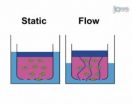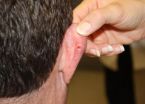Mind vs. body? Dualist beliefs linked with less concern for healthy behaviors
2012-07-26
(Press-News.org) Many people, whether they know it or not, are philosophical dualists. That is, they believe that the brain and the mind are two separate entities. Despite the fact dualist beliefs are found in virtually all human cultures, surprisingly little is known about the impact of these beliefs on how we think and behave in everyday life.
But a new research article forthcoming in Psychological Science, a journal of the Association for Psychological Science, suggests that espousing a dualist philosophy can have important real-life consequences.
Across five related studies, researchers Matthias Forstmann, Pascal Burgmer, and Thomas Mussweiler of the University of Cologne, Germany, found that people primed with dualist beliefs had more reckless attitudes toward health and exercise, and also preferred (and ate) a less healthy diet than those who were primed with physicalist beliefs.
Furthermore, they found that the relationship also worked in the other direction. People who were primed with unhealthy behaviors – such as pictures of unhealthy food – reported a stronger dualistic belief than participants who were primed with healthy behaviors.
Overall, the findings from the five studies provide converging evidence demonstrating that mind-body dualism has a noticeable impact on people's health-related attitudes and behaviors. Specifically, these findings suggest that dualistic beliefs decrease the likelihood of engaging in healthy behavior.
These findings support the researchers' original hypothesis that the more people perceive their minds and bodies to be distinct entities, the less likely they will be to engage in behaviors that protect their bodies. Bodies are ultimately viewed as a disposable vessel that helps the mind interact with the physical world.
Evidence of a bidirectional relationship further suggests that metaphysical beliefs, such as beliefs in mind-body dualism, may serve as cognitive tools for coping with threatening or harmful situations.
The fact that the simple priming procedures used in the studies had an immediate impact on health-related attitudes and behavior suggests that these procedures may eventually have profound implications for real-life problems. Interventions that reduce dualistic beliefs through priming could be one way to help promote healthier – or less self-damaging – behaviors in at-risk populations.
###For more information about this study, please contact: Matthias Forstmann at matthias.forstmann@uni-koeln.de.
The APS journal Psychological Science is the highest ranked empirical journal in psychology. For a copy of the article ""The mind is willing, but the flesh is weak": The effects of mind-body dualism on health behavior" and access to other Psychological Science research findings, please contact Anna Mikulak at 202-293-9300 or amikulak@psychologicalscience.org.
ELSE PRESS RELEASES FROM THIS DATE:
2012-07-26
EAST LANSING, Mich. — A survey conducted by Michigan State University reveals strong public support for government programs to assist farmers to adapt to climate change.
According to NASA research, global temperatures have been rising for decades, and it's affecting all aspects of agriculture. Regardless of what those surveyed believe causes climate change, more than 65 percent of them support government assistance for farmers, said Scott Loveridge, MSU professor of agricultural, food and resource economics.
This year has been a particularly harsh example. This summer's ...
2012-07-26
GREENBELT, Md. -- Researchers analyzing meteorite fragments that fell on a frozen lake in Canada have developed an explanation for the origin of life's handedness – why living things only use molecules with specific orientations. The work also gave the strongest evidence to date that liquid water inside an asteroid leads to a strong preference of left-handed over right-handed forms of some common protein amino acids in meteorites. The result makes the search for extraterrestrial life more challenging.
"Our analysis of the amino acids in meteorite fragments from Tagish ...
2012-07-26
Women with diabetes are just as likely to be interested in, and engage in, sexual activity as non-diabetic women, but they are much more likely to report low overall sexual satisfaction, according to a UCSF study.
The researchers also found that diabetic women receiving insulin treatment were at higher risk for the specific complications of lubrication and orgasm.
"Diabetes is a recognized risk factor for erectile dysfunction in men, but there have been almost no data to indicate whether it also affects sexual function in women," said senior author Alison J. Huang, ...
2012-07-26
July 25, 2012
There are many factors that affect tumor invasion, the process where a tumor grows beyond the tissue where it first developed. While factors like genetics, tissue type and environmental exposure affect tumor metastasis and invasion, physical forces like fluid flow remain a poorly understood component of tumor invasion. A new video article in JoVE, the Journal of Visualized Experiments, describes a novel procedure that allows researchers to study and test the microenvironment of a growing tumor. The technique is valuable because it allows scientists to assay ...
2012-07-26
URBANA -- Events that take place early in life almost certainly have consequences for later cognitive development. Establishing the connections is difficult, however, because human infants cannot be used as laboratory subjects.
Rodney Johnson and his collaborators have developed an alternative model for studying infant brain development. "Assistant professor Ryan Dilger and I became interested in establishing the neonatal piglet as a model of human brain and cognitive development 3 or 4 years ago," he said.
The idea came to Johnson when a former student, who was working ...
2012-07-26
New research conducted by biologists at Texas A&M University suggests that ZOLOFT®, one of the most widely prescribed antidepressants in the world, also packs a potential preventative bonus — potent mechanisms capable of inhibiting deadly fungal infections.
The findings are the result of a two-year investigation by Xiaorong Lin, assistant professor of biology, and Matthew S. Sachs, professor of biology, involving sertraline hydrocholoride (ZOLOFT) and its effects on Cryptococcus neoformans, the major causative agent of fungal meningitis — specifically, cryptococcal meningitis, ...
2012-07-26
Raising levels of the neurotransmitter dopamine in the frontal cortex of the brain significantly decreased impulsivity in healthy adults, in a study conducted by researchers at the Ernest Gallo Clinic and Research Center at the University of California, San Francisco.
"Impulsivity is a risk factor for addiction to many substances, and it has been suggested that people with lower dopamine levels in the frontal cortex tend to be more impulsive," said lead author Andrew Kayser, PhD, an investigator at Gallo and an assistant professor of neurology at UCSF. "We wanted to ...
2012-07-26
Almost half of the tropical forest reserves in a new study are ineffective, according to results published in the journal Nature by William Laurance, research associate at the Smithsonian Tropical Research Institute now at James Cook University in Australia and more than 200 co-authors.
"Biodiversity is declining rapidly at reserves including Kahuzi Biega in the Democratic Republic of Congo, Xishuangbanna in southern China, and Northern Sierra Madre in the Philippines, among others," said Laurance. "Reserves that are doing relatively well include Bwindi Impenetrable N.P. ...
2012-07-26
Ann Arbor, Mich. — University of Michigan researchers have discovered a new cause of congenital myopathy: a mutation in a previously uncharacterized gene, according to research published this month in the American Journal of Human Genetics.
About 50% of congenital myopathy cases currently do not have a known genetic basis, presenting a clear barrier to understanding disease and developing therapy, says James Dowling, M.D., Ph.D., the paper's co-senior author and assistant professor of Pediatric Neurology at the University of Michigan's C.S. Mott Children's Hospital. Finding ...
2012-07-26
PROVIDENCE, R.I. [Brown University] — In the powerful sunlight of July, newly published results from a large study of people at high risk for basal cell carcinoma support the emerging view of the nation's most common cancer as a chronic ailment that often repeatedly afflicts older people but for which the seeds may be planted in youth. The research also found a new association with eczema.
"Basal cell carcinoma is a chronic disease once people have had multiple instances of it, because they are always at risk of getting more," said Dr. Martin Weinstock, professor of dermatology ...
LAST 30 PRESS RELEASES:
[Press-News.org] Mind vs. body? Dualist beliefs linked with less concern for healthy behaviors


